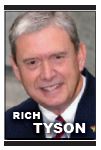Richard Tyson
Realistically, we all know that business — and life — will regularly deliver doses of both success and failure. We also recognize that we are not predisposed to react in a positive, optimistic manner when we experience setbacks. However, studies by noted psychologist Martin Seligman have shown that how we react to such challenges have a significant impact on how our people, in turn, respond. Further, our reactions tend to leave a lasting impression that carries on well into the future.
Seligman’s studies show that when{mprestriction ids="1,3"} failures, disappointments or setbacks occur, optimistic leaders will generally attribute the problem to one of the following three causes:
• Specific failure to fully understand the current situation. This specificity provides guidance toward discovery of the root cause of the setback.
• A transient unexpected factor intervened in the situation that pulled us off track. We’ll learn from this and do better next time.
• A universal event outside of our control disrupted us. The recent COVID-19 pandemic is an example of such a universal cause.
Inherently pessimistic leaders, on the other hand, Seligman describes as more likely to attribute their failures to:
• A global sense of their team’s fallibility. They place blame on what they see as the overwhelming flaws of their people.
• An assessment that their problems are chronic, deep-seated and irreversible.
• The personal inadequacies of themselves and the individuals on their team.
But what about how leaders respond to success? Seligman notes that optimists and pessimists seem to reverse their practices when good times prevail. Optimistic leaders:
• Are global in their assessment of why successes have occurred. They believe that they and their teams are inherently astute and talented; that they are destined most often to be winners.
• Anticipate that success is likely to be replicable, even chronic or habitual.
• Give credit for success where it is due, taking occasion to make it personal for each individual who contributed.
Pessimists, however, will often attribute success narrowly to:
• Specific causes or persons.
• A transient situation or circumstance, even just “good luck.”
• Causes outside their control, such universal factors like a “good economy.”
One might say that optimistic leaders are just more resilient than pessimists, and that they are better at celebrating and sharing success. Those observations are correct, but they don’t share the whole story.
Seligman notes that these respective attributes of optimism and pessimism, while subtle, are nevertheless picked up by our people. Those who work with optimistic leaders tend to more readily focus on solving problems and moving on. Those who work for pessimists often “duck and run for cover” as they feel the sting of general and specific blame.
Clinical studies add that optimistic leaders are much better at reducing stress in the workplace, thereby limiting negative hormonal responses. When faced with a threatening situation, our adrenal glands release cortisol. This contributes to our “fight or flight” response, and to a point, this is good. However, when cortisol levels are constantly high due to chronic stress, they may result in high blood sugar, and even Type 2 diabetes. In other words, if you are an inherently pessimistic leader, you may well be contributing to health problems for your people.
Clinicians note that optimistic leaders can affect hormonal responses as well. Although not a precise science, optimists seem to have a positive effect on the four “feel good” hormones: serotonin, oxytocin, dopamine and endorphins. And these hormones tend to relate to strong engagement, problem-solving and resilience. Optimistic leaders, therefore, inspire confidence and competence.
It is, of course, rare to find anyone who is optimistic all the time. And in our uncertain and turbulent world, it is quite likely that virtually all of us will experience some pessimism, self-doubt, or even depression. But the message from Dr. Seligman is clear. As leaders, we can choose to adopt a fairly optimistic leadership style. That will pay huge dividends in engagement, energy and in operational and financial outcomes.
Richard Tyson is the founder, principal owner and president of CEObuilder, which provides forums for consulting and coaching to executives in small businesses.{/mprestriction}








